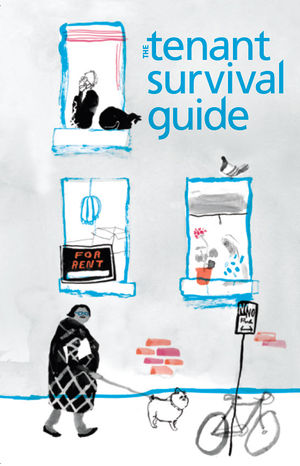Difference between revisions of "About the Tenant Survival Guide"
| Line 1: | Line 1: | ||
{{Tenant Survival Guide TOC}} | {{Tenant Survival Guide TOC}} | ||
The ''[[Tenant Survival Guide]]'' is intended to give tenants a basic understanding of residential tenancy law in British Columbia and what it means to them. | The ''[[Tenant Survival Guide]]'' is intended to give tenants a basic understanding of residential tenancy law in British Columbia and what it means to them. | ||
==Dislcaimer== | |||
TRAC makes no representations, express or implied, that the information contained in the ''Tenant Survival Guide'' can or will be used or interpreted in any particular way by any government agency or court. As legal advice must be tailored to the specific circumstances of each case, and laws are constantly changing, nothing provided herein should be used as a substitute for the advice of competent counsel. | |||
==Top Five Survival Tips for Problem Free Renting== | ==Top Five Survival Tips for Problem Free Renting== | ||
| Line 34: | Line 38: | ||
The online version of the ''Tenant Survival Guide'' is available on Clicklaw Wikibooks at [http://wiki.clicklaw.bc.ca wiki.clicklaw.bc.ca]. The online version should be consulted for the most recent information on topics covered by this publication. | The online version of the ''Tenant Survival Guide'' is available on Clicklaw Wikibooks at [http://wiki.clicklaw.bc.ca wiki.clicklaw.bc.ca]. The online version should be consulted for the most recent information on topics covered by this publication. | ||
==Information about TRAC publications== | ==Information about TRAC publications== | ||
Revision as of 21:45, 11 December 2018
The Tenant Survival Guide is intended to give tenants a basic understanding of residential tenancy law in British Columbia and what it means to them.
Dislcaimer
TRAC makes no representations, express or implied, that the information contained in the Tenant Survival Guide can or will be used or interpreted in any particular way by any government agency or court. As legal advice must be tailored to the specific circumstances of each case, and laws are constantly changing, nothing provided herein should be used as a substitute for the advice of competent counsel.
Top Five Survival Tips for Problem Free Renting
- Read the Tenant Survival Guide
- Take TRAC's online course, Renting It Right
- Gather evidence and put everything in writing
- Carefully review anything you are asked to sign
- Pay your full rent on time
Still facing problems with your landlord? Visit TRAC’s website or call TRAC’s Tenant Infoline at 604-255-0546 or 1-800-665-1185.
Publication details
![]()
The Tenant Survival Guide is produced by the Tenant Resource & Advisory Centre, a non-profit organization that promotes the legal protection of residential tenants across BC by providing information, education, support, and research on residential tenancy matters.
- First edition: 1984
- Thirteenth edition: 2018
The following people worked on the thirteenth edition:
- Writing: Andrew Sakamoto
- Illustrations: Kate O’Connor
- Legal supervision/editing: Zuzana Modrovic
- Project coordination: Andrew Sakamoto
TRAC acknowledges funding from The Law Foundation of BC, Province of British Columbia, and City of Vancouver.
Online version
The online version of the Tenant Survival Guide is available on Clicklaw Wikibooks at wiki.clicklaw.bc.ca. The online version should be consulted for the most recent information on topics covered by this publication.
Information about TRAC publications
To request a copy of the Tenant Survival Guide or Landlord Guide, contact Emma at TRAC via email at emma@tenants.bc.ca. We may require a shipping fee for bulk orders.
In addition to the Tenant Survival Guide in English, Traditional Chinese and Spanish, TRAC also publishes a Tenant Info pamphlet with basic information about tenancy law in BC. The pamphlet is available in English, Punjabi, Traditional Chinese, Spanish, Arabic, Persian, Korean, Japanese and Portuguese.
TRAC also publishes a Landlord Guide in English, Traditional Chinese and Punjabi, as well as a Newcomers Guide in Simplified Chinese, French, Persian and Korean.
You can download all of TRAC’s publications from our website at www.tenants.bc.ca.
TRAC's Online Course
TRAC also has a free online course for renters, called Renting it Right. The course covers both practical and legal topics to consider before deciding to rent. Students learn how to search for rental housing, submit a strong application, understand a tenancy agreement, and move in to a new place. By completing the course and passing the final exam, you can earn a certificate to present to prospective landlords with a rental application. Check it out at www.rentingitright.ca.
Connect with TRAC
- Become a member of TRAC.
- Check out TRAC’s Facebook Page.
- Follow us on Twitter at www.twitter.com/TRAC_BC.
| ||||||||||||||||||||||||||||||||||||||

